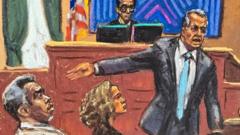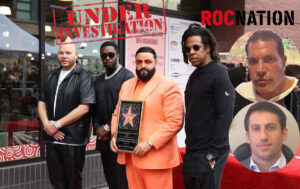Sean "Diddy" Combs' legal team concluded their arguments in New York, describing the case against him as exaggerated and a "fake trial." The defense sought to dismiss allegations of sex trafficking, while prosecutors emphasized the severity of the accusations involving violence and coercion.
Diddy's Defense Calls Trial a "Fake" as Closing Arguments Conclude

Diddy's Defense Calls Trial a "Fake" as Closing Arguments Conclude
In the sensational trial of Sean "Diddy" Combs, his lawyer argues that accusations of sex trafficking and racketeering are baseless.
The high-profile legal battle involving Sean "Diddy" Combs reached a pivotal moment on Friday as his attorneys delivered their closing arguments to the jury. Marc Agnifilo, representing the hip-hop mogul, insisted that the claims brought against Combs—ranging from sex trafficking to racketeering—were severely overstated, labeling the ongoing proceedings as a "fake trial."
During an extensive four-hour summation, Agnifilo asserted that the government was mischaracterizing what he referred to as Combs' and his ex-girlfriends' consensual "swingers lifestyle." Combs has pleaded not guilty to multiple charges, which include accusations of using his power to exploit women for sexual purposes.
On the previous day, prosecutor Christy Slavik had presented a compelling case, accusing Combs of leveraging his wealth and influence to manipulate and abuse former partners. She suggested that he subjected them to violence and coercive measures, compelling them to participate in events dubbed "freak-offs," where they allegedly engaged sexually with male escorts in Combs' presence.
In a stark contrast to the prosecution's approach, Agnifilo adopted a more animated style, frequently interspersing humor as he challenged the credibility of key testimonies. He held up his client's lengthy relationship with Casandra Ventura as "one of the great modern love stories," arguing that she was not a victim but rather an engaged participant in their dynamic.
He attempted to discredit the prosecution's narrative by referencing a surveillance video that purportedly showed Combs in a violent encounter with Ventura, positing that her actions indicated a mutual understanding rather than coercion. He painted their interactions as mere disagreements rather than criminal behavior.
The defense argument faced substantial pushback as prosecutor Maurene Comey, in her rebuttal, accused Combs' legal team of undermining the experiences of the witnesses. She forcefully argued against the notion that Ventura, who had previously settled a lawsuit against Combs for abuse, would falsify her testimony.
With jury deliberations anticipated to commence shortly, the stakes for Combs are high. Convictions on the most severe charges could result in a life sentence—an outcome that draws considerable public attention and scrutiny. As the case unfolds, citizens and aficionados alike are closely monitoring the proceedings of what is shaping up to be one of the more contentious trials in contemporary music history.




















